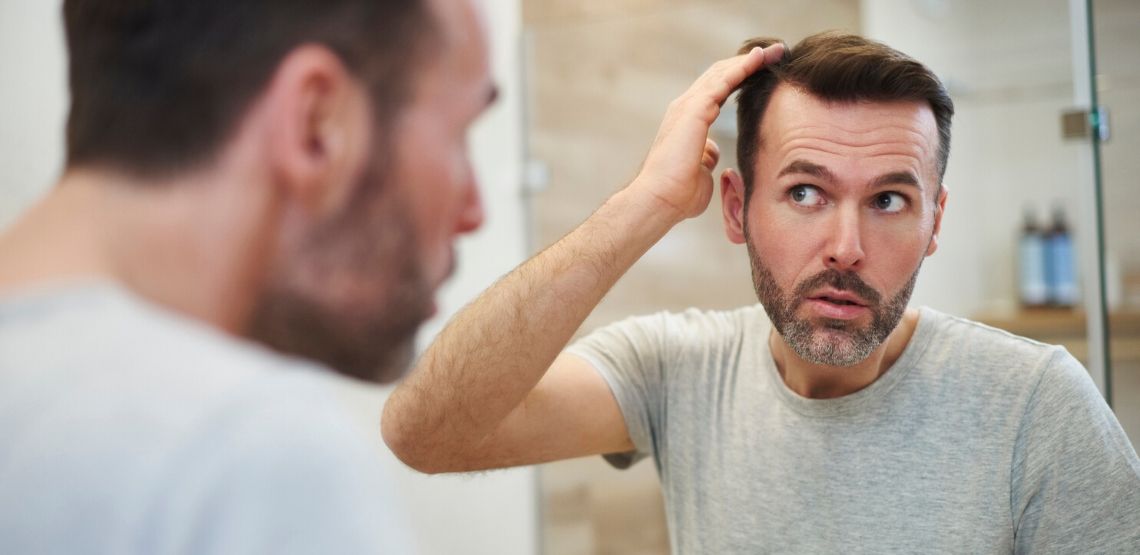What Causes Hair Loss?
Hair loss can occur in areas all around your body, from your legs to your scalp. While anyone can experience hair loss it is more common in men. There are different types of hair loss as well, like alopecia, which is partial or complete loss of hair, often resulting in bald patches on the scalp or other areas of the body. If you experience alopecia, consider LITFULO, a once-daily prescription pill for both adults and adolescents as young as 12.
Different Types of Hair Loss
The cause of hair loss often depends on certain risk factors, as well as the type of hair loss.
1. Baldness
Baldness is one of the most common types of hair loss, especially in men. The most common cause of baldness is due to hereditary hair loss when aging. According to Mayo Clinic, this type of hair loss is called either female-pattern baldness or male-pattern baldness. This usually starts with bald spots and a receding hairline for men, and for women, it often results in thinning hair.
2. Hormonal Hair Loss
Hormonal changes are another potential cause of hair loss. This can include hormonal changes due to being pregnant, childbirth, menopause and issues with the thyroid. Medical conditions such as alopecia areata, ringworm on the scalp and trichotillomania can all cause some type of hair loss on the head.
3. Hair Loss From Medication
Certain medications can also cause hair loss, specifically, some used to treat things like depression, arthritis, cancer, heart issues, high blood pressure and gout. Radiation therapy in the skull area can also result in inconsistencies in hair growth in the future.
4. Hair Loss From Stress
Stressful events can also cause temporary hair loss, as well as certain hair treatments and hairstyles that can influence the loss of hair or thinning of hair. Drastic weight loss can also be a contributing factor to hair loss, as malnutrition can be present.
Ways to Help Prevent Hair Loss
Hair loss that is tied to genetics is unfortunately not preventable. However, there are certain things you can do to prevent other forms of hair loss.
Avoiding hairstyles that constrict your hair can help prevent hair loss. This means buns, braids and ponytails should be avoided to help prevent hair loss. It is also good to avoid motions such as repetitive pulling, rubbing, or twisting of your hair. Being gentle with your hair is one of the best ways to prevent unnecessary hair loss, as stress to the scalp can cause hair loss.
Hot oil treatments, hot rollers, curling irons and permanents should also be avoided. These can increase your chance of hair loss. Certain medications and dietary supplements can also increase your chance of losing hair. Smoking has also been shown to have a connection with baldness in men.
Related Search Topics (Ads)
Treatment Options for Hair Loss
There are treatment options for some types of hair loss. Medications, laser therapy and hair transplant surgery are all potential treatment options. In some instances, these methods work and in other instances, they do not.
Rogaine Treatment
Baldness caused by genetics can be treated with certain types of medications. Rogaine is an over-the-counter option that can be used by both women and men. It can be in either liquid or foam form which is then rubbed on your scalp daily. At first, you may lose some hair during the treatment. The new hair may not be as thick as your previous hair, and it may be slightly shorter. To start the regrowth of hair and prevent hair loss, it is recommended to use it for at least six months daily.
Finasteride Treatment
Finasteride is another type of medication available via prescription from a doctor that is for men. It is taken as a pill daily. It is not as effective for men over 60. This mainly slows the amount of hair loss that occurs, and some men see new hair growth. To retain the benefits you must continue taking it.
Hair Transplants and Hair Restoration Surgery
Hair transplants or hair restoration surgeries are also treatment options one may consider. During hair transplant surgery, patches of skin are taken from the side or back of your head that contains hair. From there, hairs are placed follicle by follicle into the area on top of the head that is balding. Sometimes doctors may recommend using Rogaine after the treatment.
Laser Therapy
Laser therapy is still a fairly new form of treatment. Some studies show that it improves hair density, however, more research is needed to fully understand the long-term effects.
Litfulo for Alopecia Areata
Litfulo is a once-daily prescription pill that helps with severe alopecia areata, leaving bald patches of hair. It has been shown to cause significant hair growth in under six months. See if it's right for you by checking out Litfulo for yourself.
Talking to Your Doctor About Hair Loss
Now that you know about what causes hair loss, it may be good to consult a doctor if you have any of the above symptoms. Hair loss can be difficult to deal with at times. While some types of hair loss may be preventable by making certain lifestyle choices, other types are not. If you start to experience hair loss, consider visiting your doctor. Not only will your doctor be able to identify what may be causing the hair loss, but they will also be able to tell you which treatment options may be the best for you.


